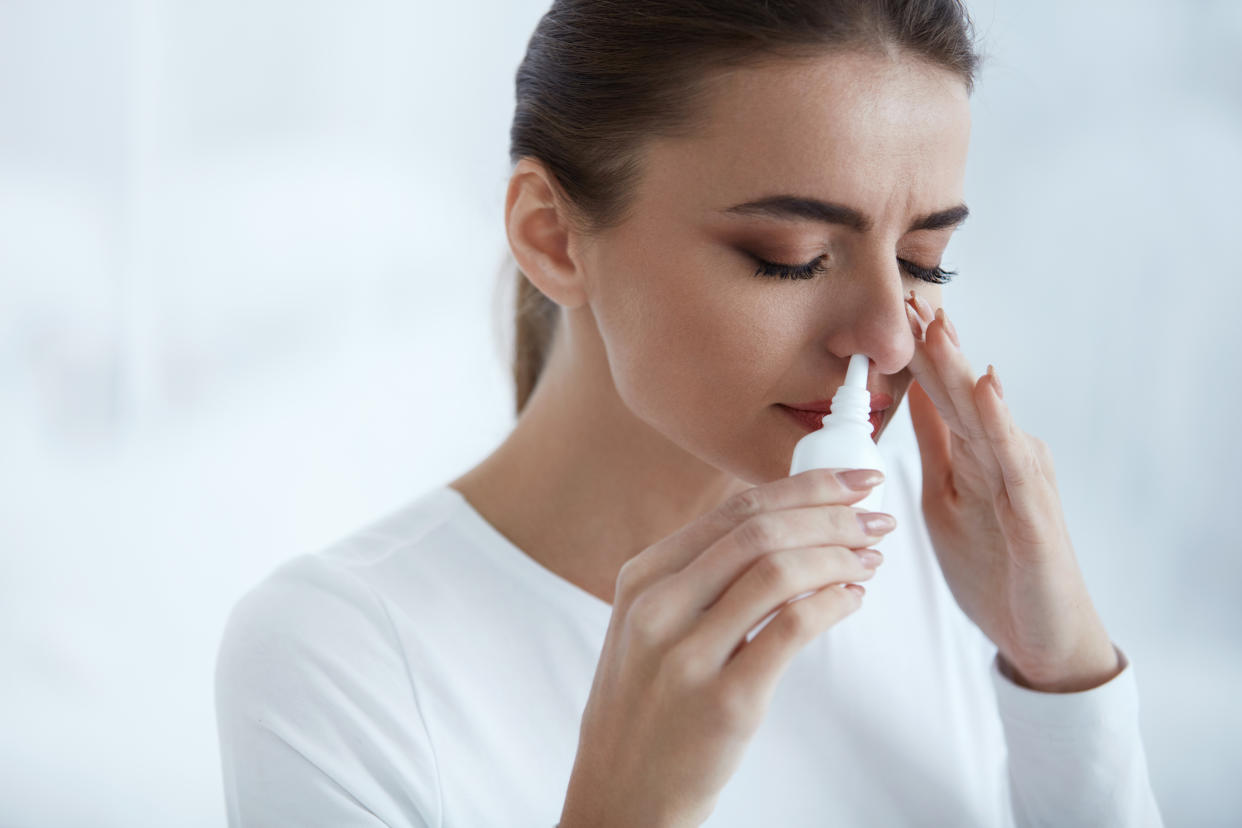Ketamine-like nasal spray approved in US to help adults with acute suicidal behaviour

A ketamine-like drug has been approved for US patients considering suicide.
Johnson & Johnson’s (J&J) Spravato has been used by around 6,000 Americans since it got the green light for treatment-resistant depression in March 2019.
The Phase 3 clinical trials in adult patients with major depressive disorder with acute suicidal ideation or behaviour were initiated in 2017.
The drug was approved by the US Food and Drug Administration (FDA) after Yale scientists demonstrated it reduced depressive symptoms within 24 hours.
Read more: Half a million Britons take online suicide prevention course during lockdown
Antidepressants, which are approved to boost mood rather than specifically ward off suicidal thoughts, can take up to two weeks to be effective.
The “life changing” FDA approval comes after scientists from Columbia University Irving Medical Center found Google searches for suicide prevention helplines have risen amid the coronavirus outbreak.

‘Life changing’ spray ‘provides relief within a day’
“Many people who live with depression know all too well the feeling of desperation,” said Theresa Nguyen from Mental Health America.
“If that major depression progresses to active suicidal thoughts, it’s crushing, and they need options to help change the trajectory of their acute depressive episode.
“Traditional oral antidepressants need weeks or more to take effect, so the availability of a medicine that can begin providing relief within a day is potentially life changing.”
Read more: How to encourage someone with suicidal thoughts to reach out for help
Suicide is the tenth leading cause of death in the US, with 48,344 people taking their life in 2018.
In the UK and Ireland, 6,859 people died by suicide in 2018.
The NHS does not offer treatment for suicide specifically. It instead urges anyone who is considering ending their life to confide in a loved one, or call a free helpline like The Samaritans or the Campaign Against Living Miserably (CALM).
Suicidal thoughts are often linked to mental-health conditions like depression, which the NHS treats via medication and talking therapies.
Research suggests between 50% and 65% of patients see an improvement in their mood after taking antidepressants, compared to 25% to 30% of those on a placebo.
Read more: Probiotics 'may help ease depression'
The drugs typically have to be taken for one to two weeks before a patient experiences a benefit.
Spravato “may offer clinicians a new way to provide support to patients quickly in the midst of an urgent depressive episode and help set them on the path to remission”, said trial investigator Dr Gerard Sanacora.
Offers ‘possibility of a better future’
The FDA has approved the spray to treat “depressive symptoms in adults with major depressive disorder with acute suicidal ideation or behaviour” when prescribed alongside an oral antidepressant.
This came about after two trials demonstrated “a significant, rapid reduction of depressive symptoms within 24 hours”.
Some of the patients even started to respond after “as early as four hours”.
When combined with “standard of care”, Spravato resulted in up to a 16-point decrease on the Montgomery-Åsberg Depression Rating Scale – which assesses the severity of symptoms – 24 hours after the first dose.
This is compared to up to a 12.2 point reduction among those on placebo, plus “standard of care”.
“Standard of care” was made up of an initial hospitalisation, a newly initiated or optimised oral antidepressant and twice-weekly treatment visits for four weeks, during which patients received Spravato or a placebo nasal spray.
Both the Spravato and placebo groups continued to improve between four hours and 25 days later.
Among those receiving Spravato and standard of care, up to 43% went on to achieve clinical remission – minimal or no depression symptoms – compared to up to 34% in the placebo groups.
There was not a statistically significant difference between Spravato and the placebo when it came to “improvement in the severity of suicidality at 24 hours”.
“The clinical trials supporting this new indication provide compelling evidence that [Spravato] may offer clinicians a new way to provide support to patients quickly in the midst of an urgent depressive episode and help set them on the path to remission,” said Dr Sanacora.
The spray has been approved for use twice a week for four weeks, after which evidence of any therapeutic benefit should be evaluated to determine whether to continue.
“People living with major depression need more options to meet their most critical needs, and we're proud to help redefine how we treat ongoing and acutely worsening depressive symptoms,” said Dr Bill Martin from J&J.
“Spravato can now help patients with challenging to treat depression find significant and swift relief from debilitating depressive symptoms, offering those living with this serious mental health condition the possibility of a better future.”
What is the ketamine-like drug?
Spravato’s active ingredient is esketamine, which has the same molecular formula as ketamine. Although known as a “party drug”, ketamine is used by the NHS to relieve pain.
Esketamine is thought to boost mood by targeting the chemical glutamate.
Although approved by the FDA for treatment-resistant depression, esketamine has not been given the green light for use by the NHS.
This is after the official health watchdog National Institute for Health and Care and Excellence (Nice) claimed there are too many uncertainties regarding its price relative to its benefits.
When given for treatment-resistant depression, Spravato is said to cost around £10,000 ($13,057.95) for one course of treatment.
For confidential emotional support at times of distress, contact The Samaritans at any time by calling 116 123 or emailing jo@samaritans.org.

